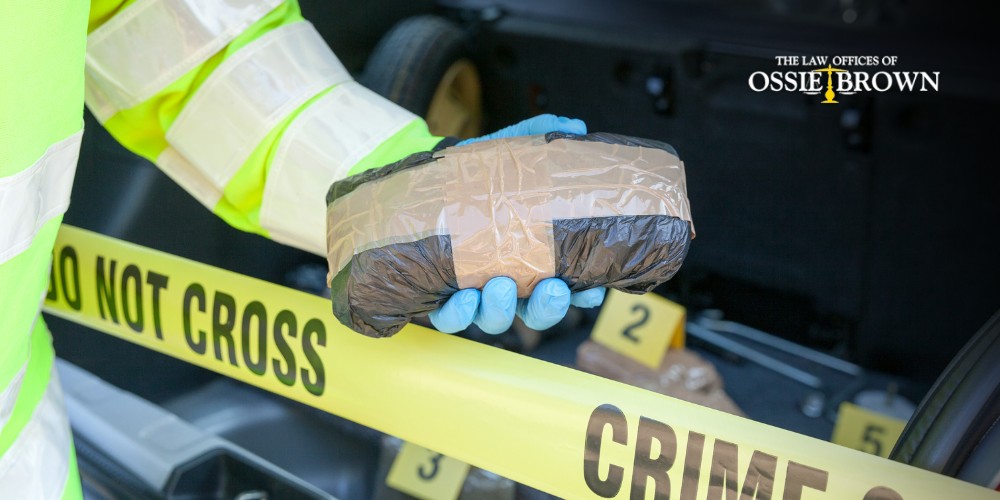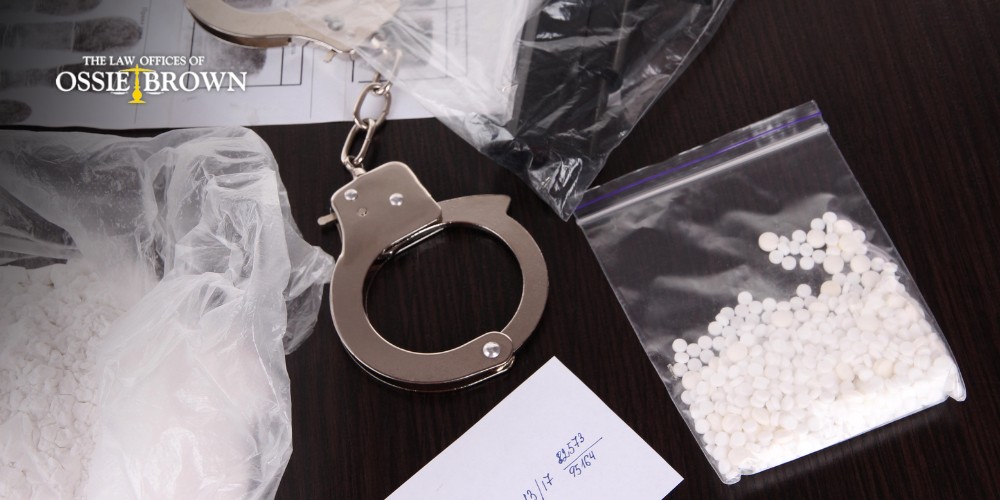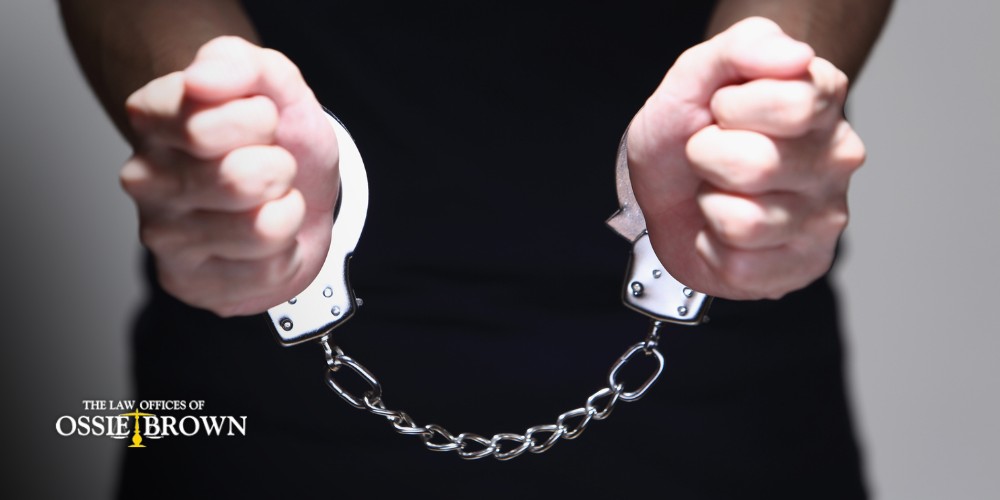Drug Crimes
Home / Criminal Defense / Drug Crimes
Practice Areas
Baton Rouge Drug Crime Lawyer
An arrest for a drug offense can happen in seconds, but its impact can last a lifetime. At The Law Offices of Ossie Brown, our Baton Rouge drug crime lawyer team defends people arrested throughout Louisiana who are accused of possessing, distributing, or manufacturing controlled substances. Every case matters, and our firm works relentlessly to protect clients from the serious consequences of a criminal conviction.
We have decades of trial experience representing individuals in East and West Baton Rouge Parishes and beyond. We understand how the government builds its cases and what it takes to achieve a favorable outcome, whether through dismissal, reduced charges, or a not guilty verdict.
If you’re facing drug charges and need a strong defense, call (225) 343-1111 or contact us online to speak directly with an attorney who will fight on your behalf.

Aggressive Defense for Drug Charges in East and West Baton Rouge Parishes, Ascension Parish, and Livingston Parish
If you’re facing charges for simple marijuana possession, prescription drug fraud, or federal drug trafficking allegations, a Baton Rouge criminal defense attorney at The Law Offices of Ossie Brown understands what is at stake and will fight aggressively for your rights. Our experienced firm has defended clients throughout East and West Baton Rouge Parishes, Ascension Parish, and Livingston Parish against all types of drug charges under Louisiana law.
We know how prosecutors build cases and use that knowledge to strike back early. Our lawyers challenge illegal searches, expose weak evidence, and seek every opportunity to reduce or dismiss charges. When necessary, we take cases to trial and fight for acquittals with a focused, strategic defense to secure the best possible result for each client.

Louisiana Drug Laws
Louisiana law imposes some of the harshest penalties in the country for drug crimes. Under Title 40 of the Louisiana Revised Statutes, the state regulates all controlled substances and outlines penalties for offenses related to drug possession, distribution, and manufacturing. The severity of charges depends on the type of substance, the quantity involved, and whether the intent was for personal use or sale.
Even a minor mistake can result in a felony conviction, substantial fines, and imprisonment. Understanding how these laws apply to your case is important when building a strong defense and protecting your future.
Title 40 Controlled Substances
Under Title 40 of the Louisiana Revised Statutes, all controlled dangerous substances are classified, regulated, and penalized according to their risk of abuse and medical use. This statute serves as the foundation for every drug crime prosecuted in Louisiana, setting out precise definitions and sentencing ranges for possession, distribution, and manufacturing offenses.
Title 40 also governs how law enforcement and prosecutors handle evidence, determine felony charges, and pursue convictions involving controlled substances. Only those with a valid prescription or authorized medical license can possess or dispense these drugs legally.
Schedule 1 - Schedule 5 Drug Charges
Under La. R.S. 40:964, controlled substances are classified into five schedules based on their medical use and potential for abuse. The schedule determines the seriousness of the drug charges, potential felony penalties, and the strength of available defense strategies.
- Schedule I: No accepted medical use and high potential for abuse, including heroin, LSD, ecstasy, and marijuana.
- Schedule II: Limited medical use and severe risk of addiction, such as cocaine, methamphetamine, fentanyl, and oxycodone.
- Schedule III: Moderate risk substances, including anabolic steroids and lower-dose opioid combinations.
- Schedule IV: Medications with lower abuse potential, such as Xanax, Valium, and Ambien.
- Schedule V: Least restricted drugs, often cough syrups with small amounts of codeine.
Every drug charge carries serious risks under Louisiana law, and the outcome depends on how effectively your defense attorney challenges the prosecution’s case.
Drug Possession vs Distribution Penalties
The difference between drug possession and distribution charges can determine whether someone faces a misdemeanor or a felony with decades in prison. Simple possession applies when drugs are found in small amounts consistent with personal use and there is no proof of intent to distribute. Prosecutors, however, may pursue distribution charges even without evidence of a sale if they can demonstrate intent through items such as packaging materials, digital scales, large sums of cash, or customer lists.
State Drug Laws vs Federal
Most drug cases in Baton Rouge are prosecuted under Louisiana law in the 19th Judicial District Court, but some situations fall under federal jurisdiction. Federal involvement typically occurs when a case involves large quantities of controlled substances, interstate trafficking, or organized criminal activity. The Drug Enforcement Administration (DEA) and the U.S. Attorney’s Office handle these prosecutions under 21 U.S.C. §841 and related federal statutes.
Federal drug prosecutions carry far greater consequences. Convictions can result in lengthy prison sentences, steep fines, and permanent felony records. Judges have limited discretion because mandatory minimums set fixed terms that cannot be reduced or waived. Having a Baton Rouge federal criminal defense lawyer who understands Louisiana law is important since many cases involve overlapping state and federal charges. Louisiana state cases, prosecuted under Title 40, may offer drug court, probation, or treatment-based alternatives that are rarely available in the federal system.

Baton Rouge Drug Crimes Our Criminal Defense Attorneys Handle
The Law Offices of Ossie Brown defends individuals throughout Baton Rouge and the surrounding parishes who are charged with drug crimes under Louisiana law. Our criminal defense attorneys handle cases involving possession, distribution, trafficking, manufacturing, prescription drugs, and related controlled substance offenses.
Drug Possession
Simple possession involves having a controlled substance for personal use without a valid prescription. Charges may include marijuana possession, cocaine possession, heroin possession, or fentanyl possession, as well as unauthorized possession of prescription medications. Louisiana law distinguishes between first-time and repeat offenses, and penalties increase sharply for individuals previously convicted of similar conduct.
The difference between a misdemeanor and a felony depends on the quantity and type of substance involved. Smaller amounts generally lead to drug possession charges, while larger quantities can suggest intent to distribute. A Baton Rouge drug possession lawyer can review the evidence, evaluate probable cause, and determine whether any search or seizure violated your rights.
Drug Distribution and Trafficking
Distribution and trafficking charges are based on intent to distribute, not proof of a completed sale. Prosecutors rely on circumstantial evidence, such as drug quantities, packaging materials, digital scales, large amounts of cash, or communications that suggest transactions.
A Baton Rouge drug distribution lawyer or Baton Rouge drug trafficking lawyer can assess whether the evidence truly supports intent or if it reflects possession for personal use. These cases may also involve controlled substances transported across state lines, triggering federal oversight and DEA investigations when large-scale operations are suspected.
Drug Manufacturing and Cultivation
Manufacturing charges apply to the production of controlled substances, including methamphetamine lab operations that remain prevalent in rural areas surrounding Baton Rouge and marijuana cultivation and growing operations, even for personal use, which constitute manufacturing under Louisiana law. Louisiana imposes significantly enhanced penalties when manufacturing occurs near schools, playgrounds, or other protected areas where children congregate, adding substantial prison time to severe base sentences.
Prescription Drug Fraud
Prescription drug fraud encompasses various illegal activities related to obtaining controlled substances through deception, including doctor shopping by visiting multiple physicians to obtain duplicate prescriptions, forging prescriptions, and fraudulent Medicaid or Medicare claims for medications. Pharmacy theft and diversion by employees, healthcare provider prescription fraud, and so-called “pill mill” operations where physicians improperly prescribe controlled substances without a legitimate medical purpose are all prosecuted aggressively in Louisiana.
Drug Paraphernalia
Possession of drug paraphernalia includes items such as pipes, bongs, syringes, digital scales, and baggies used for consuming, manufacturing, or distributing controlled substances. Louisiana law distinguishes between paraphernalia intended for personal use and items suggesting intent to distribute. The latter is treated more seriously and can increase the severity of related drug charges.
A Baton Rouge drug paraphernalia lawyer can review the evidence and determine whether the items seized truly qualify as illegal paraphernalia. Even common household objects can be classified as paraphernalia based on the presence of residue, location, or context.
Juvenile Drug Court Defense
Juvenile drug offenses in Baton Rouge are handled in specialized juvenile court proceedings that focus on rehabilitation rather than punishment. Louisiana’s juvenile drug court programs offer intensive supervision, mandatory drug testing, counseling, and educational requirements as alternatives to detention. Successfully completing juvenile drug court can result in charges being dismissed and records being sealed, thereby protecting a young person’s future opportunities. A Baton Rouge juvenile defense attorney from the Law Offices of Ossie Brown will work closely with families to guide them through the juvenile justice system, securing the best possible outcome for young clients facing drug charges.

Baton Rouge Drug Bust: Common Arrest Scenarios
Drug arrests in Baton Rouge occur through a variety of law enforcement tactics, each with unique legal implications. Traffic stops on I-10, I-12, and Airline Highway are among the most common, where officers use minor violations to initiate vehicle searches or deploy drug-sniffing dogs.
Other arrests result from narcotics task force raids, undercover buy operations, confidential informant tips, and search warrants executed by the Baton Rouge Police Department or the East Baton Rouge Parish Sheriff’s Office. Multi-agency investigations involving the DEA, state police, and federal authorities may also target trafficking or distribution networks operating across parish or state lines.

Defense Strategies for Baton Rouge Drug Charges
Fighting drug charges in Baton Rouge demands an aggressive defense backed by skill, precision, and a clear understanding of Louisiana law. Our criminal defense attorneys challenge every weakness in the prosecution’s case, targeting unlawful searches, unreliable evidence, and procedural violations to protect your rights and future.
Illegal Search and Seizure
The Fourth Amendment protects citizens from unreasonable searches and seizures, and violations of these rights are among the strongest defenses in drug cases. Law enforcement must have probable cause or a valid warrant to search your person, car, or home. Courts consider warrantless searches unconstitutional unless they meet specific legal exceptions.
Our criminal defense attorneys examine every detail of the stop or search to determine whether officers exceeded their authority, acted without proper probable cause, or relied on invalid warrants. When searches violate constitutional protections, we file motions to suppress evidence under the “fruit of the poisonous tree” doctrine, which excludes illegally obtained evidence and can lead to the dismissal of charges.
Defendant’s Lack of Possession or Knowledge
Prosecutors must prove beyond a reasonable doubt that you knowingly possessed the controlled substances in question. This becomes difficult when multiple people have access to the exact location. In vehicle cases involving several occupants, identifying who actually possessed the drugs is nearly impossible without clear supporting evidence.
The same challenge arises in shared residences where drugs are discovered in common spaces or another person’s room. Constructive possession requires proof that you both knew about the drugs and had control over them. This is a high legal burden that an experienced criminal defense attorney can challenge when the prosecution’s case relies on weak or circumstantial evidence.
Chain of Custody Issues
Proper handling and documentation of drug evidence is essential to maintain its integrity and admissibility in court, and chain of custody refers to the documented process of evidence collection, storage, testing, and presentation at trial. Our attorneys examine whether evidence was properly sealed, labeled, and stored, whether lab testing followed appropriate protocols, and whether evidence could have been tampered with or contaminated. Missing documentation, gaps in custody records, improper handling, and lab testing errors can all undermine the reliability and admissibility of drug evidence. The evidence may be excluded or given little weight if the state cannot prove an unbroken chain of custody.
Entrapment and Police Misconduct
Entrapment occurs when law enforcement persuades or pressures someone to commit a crime they would not have committed on their own. This defense applies when police or confidential informants use excessive pressure, threats, harassment, or appeals to friendship to encourage participation in a drug transaction.
Police misconduct may also justify dismissal of drug charges. Planted evidence, falsified reports, coerced confessions, and procedural violations can all undermine the prosecution’s case. Our criminal defense attorneys thoroughly investigate the actions of officers and informants to expose misconduct and protect your rights.

Louisiana Drug Penalties
Louisiana enforces some of the toughest drug penalties in the country. Sentences depend on the type and amount of the controlled substance, the alleged intent, and prior convictions. Under Title 40 of the Louisiana Revised Statutes, punishment for a drug conviction can range from small fines to lengthy prison terms.
- Marijuana possession (14 grams or less): A fine up to $100, no custodial arrest for a first offense.
- Marijuana possession (more than 14 grams): A fine up to $500, imprisonment in parish jail up to 6 months.
- Schedule II controlled substances (possession less than 2 grams): Imprisonment for up to 2 years, plus a fine up to $5,000.
- Schedule II controlled substances (possession of 2 grams or more but less than 28 grams): Imprisonment from 1 year to 5 years, plus a fine up to $5,000.
- Schedule III substances (Prescription drug violations): Covered under La. R.S. 40:971–972, with penalties that vary by drug type and the nature of the offense. Up to 5 years in prison, plus fines up to $5,000.
- Distribution near schools or public facilities: Enhanced penalties apply under Louisiana’s drug-free zone law, La. R.S. 40:981.3.
Because each case depends on substance, quantity, and intent, it is vital to have a qualified criminal defense attorney review the specifics to understand which penalties apply under Louisiana law.
Harsher Penalties for Drug Convictions
Mandatory minimum sentences establish fixed prison terms for drug offenses, removing judicial discretion in sentencing. Repeat offenses face doubled penalties, significantly increasing incarceration time for subsequent convictions. Habitual offender laws, often referred to as “three strikes” laws, can result in life sentences for individuals with multiple drug-related convictions, even for non-violent offenses.
Alternative Sentencing and Diversion Programs
Louisiana offers several alternatives to incarceration for drug offenders, particularly first-time offenders. The Louisiana Pretrial Diversion Program and Drug Court programs in East Baton Rouge Parish provide pathways to treatment and rehabilitation rather than punishment. First-time offenders may be eligible for conditional discharge, which can help them avoid jail time and a permanent criminal record.
Upon successful completion of these programs, participants may be eligible for criminal record expungement, which clears their prior convictions and enables them to move forward without the long-term consequences of a conviction.
How a Drug Charges Lawyer in Baton Rouge Can Help
A Baton Rouge drug charges lawyer provides a strategic defense from the moment of arrest through trial. Your attorney investigates the details of your case, challenges unlawful searches and seizures, files motions to suppress evidence, and negotiates with District Attorneys to pursue the best possible outcome.
An experienced criminal defense lawyer can also advocate for diversion programs, drug court, or other alternative sentencing options that help clients avoid jail and protect their future. When a trial becomes necessary, your lawyer will present a strong defense before the 19th Judicial District Court or federal court for cases in the Middle District of Louisiana. With extensive trial experience, our firm can successfully handle state and federal drug charges.

Contact a Baton Rouge Drug Defense Lawyer For a Free Consultation
Every moment counts after a drug arrest in Baton Rouge. Acting quickly gives your defense attorney the best chance to protect your rights and build a strong defense. Contact The Law Offices of Ossie Brown at (225) 343-1111 or contact us online to discuss your charges and develop a strategic defense plan tailored to your situation.
Free Consultation
Let us review your case at no cost to you. We want to take the time to get to know you and understand your legal goals and objectives.
Why Our Clients Trust Us
Your Law Firm for a Lifetime.
The attorneys at The Law Offices of Ossie Brown are skilled in several practice areas and ready to discuss your case. Contact us today to schedule your free consultation.
